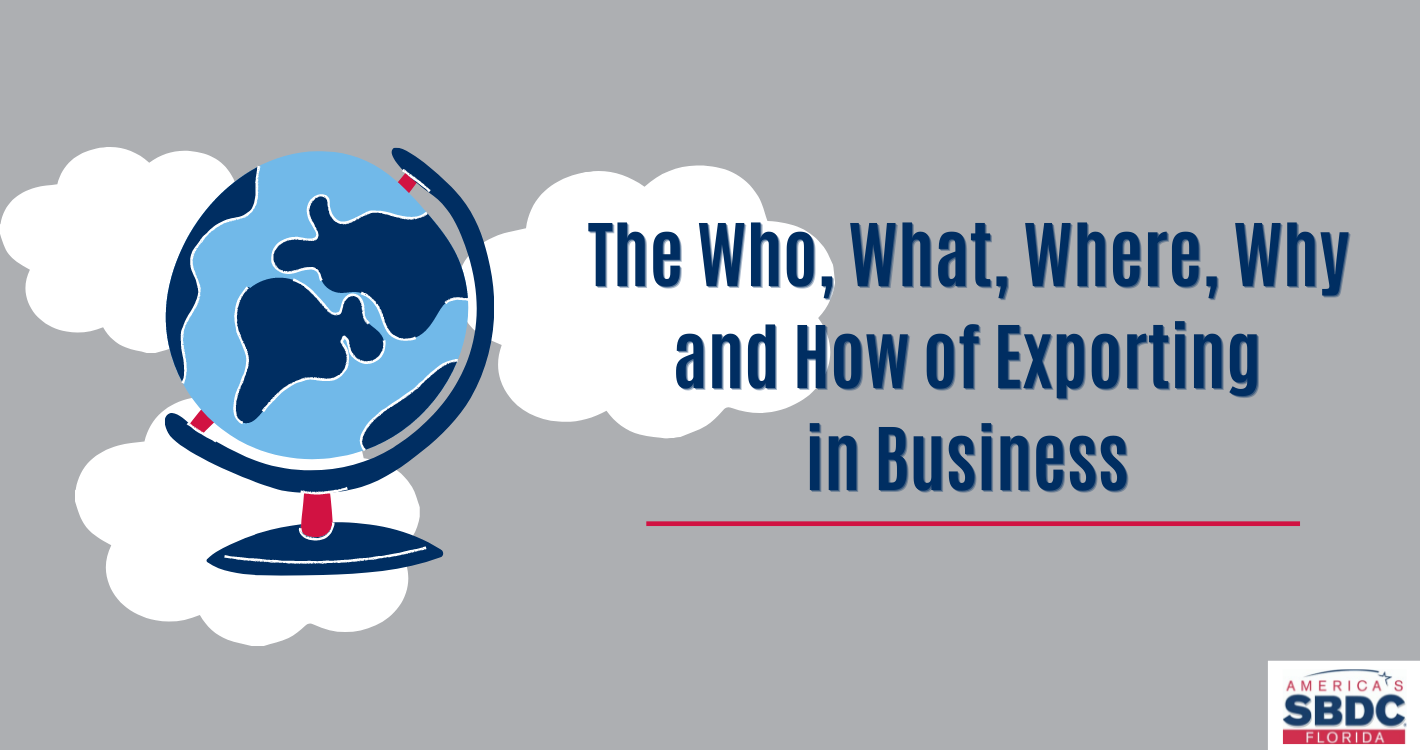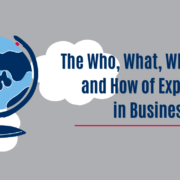Part 1: The Who, What, Where, Why and How of Exporting in Business What is Exporting?

by Selma Canas, CGBP | December 22, 2021
These are the most common question threads right now on the Internet regarding, “exporting in business” and, coincidentally or not, these are the same questions I get from clients.
- Who can help me?
- What is exporting?
- Where should I export?
- Why export?
- How does exporting work?
My standard answer is, “it depends and maybe” because there are many variables in the business of exporting. Therefore, research and due diligence must be conducted before any questions can be answered.
That being said, I will attempt to answer these questions in this 4-part series while providing resources that are available for every step of the way. So, without further ado, let’s begin.
What is Exporting?
Exporting is selling your products and/or services to a foreign buyer. These include tangible products such as medical devices, auto parts, computer equipment, machinery, household goods, etc. and intangible products such as consulting services, software, information, knowledge, etc.
The foreign buyer does not have to be physically in their country for the sale to be an export. For example, people from all over the world visit the United States and spend money here. In 2019, the travel and tourism industry accounted for 9.2 percent of all U.S. exports and 26.7 percent of all US service exports, injecting nearly $640 million a day into the U.S. economy, according to the U.S. Department of Commerce.
Due to the COVID-19 pandemic, travel and tourism has seen significant decline, as well as many other industries. On the other hand, e-commerce business has significantly increased during the pandemic.
What is E-commerce?
E-commerce is the selling of products through the company website or an online service such as Amazon, eBay, Shopify, and others. Cross-border e-commerce is also exporting. According to Shopify with data from eMarketer, in 2019, 13.6 percent of retail sales were online. In 2021, online sales are estimated to be 19.5 percent, a 45.8 percent increase in e-commerce market share. By 2024, online sales are expected to reach 21.8 percent of total retail sales worldwide.
Why is Exporting Important?
Exporting helps the economy of a country. As exports increase, so does the gross domestic product of the country, increasing the country’s wealth. Exporting creates jobs, increases industry output, and increases sales and revenue. According to the International Trade Administration, U.S. exports of goods and services in 2020 were valued at $2.1 trillion and supported more than 40 million American jobs.
Exporting is a team effort requiring the commitment of company management in time, money and resources for a successful export strategy. In addition to the internal expansion team, the company will need to develop an external team of international practitioners, including bankers, accountants, attorneys, and utilize the resources available through the U.S. Commercial Service, SelectFlorida, Global Tampa Bay, and the Florida SBDC at USF. These will be discussed in detail in part two of this series – Who Can Help.






Selma Canas
Canas, Consultants, International Consultants 2, TampaNASBITE Certified Global Business Professional (CGBP), Florida SBDC at USF, Tamp
Specialties: International Trade, Export Marketing Plans, Market Research
Selma Canas is responsible for guiding small businesses through the complexities of developing export marketing and international expansion plans and teaching seminars on basic international trade. She has developed more than 30 Export Marketing Plans during the past six years for local businesses, and participated in trade missions to Brazil, Chile, Canada, and the Dominican Republic. Canas has more than 15 years of experience in sales, marketing and customer service in a variety of industries, including freight forwarding, real estate and advertising. As a co-owner of Restaurant Guide USA, she increased sales and distribution points and tripled the size of the distributed product.
As a real estate broker-owner, Canas carved a niche in the Latin American community and had a career sales volume of more than $37 million. Canas earned her bachelor degree in economics from the University of South Florida. She is a NASBITE Certified Global Business Professional and holds an Export and Trade Counseling Certification from the U.S. Small Business Association. Selma earned Florida SBDC at USF Employee of the Year honors in 2016. She is a member of Toastmasters international and is fluent in Spanish and Portuguese.